Developer, City, Nonprofit Fighting Over Menomonee Valley Project
DCD and BID prefer industrial, commercial use. Developer wants an apartment complex.
A long-vacant Cream City brick building in the Menomonee Valley could see new life under a proposal by developer Kendall Breunig. But his plan faces opposition from the Department of City Development (DCD) and Menomonee Valley Partners (MVP), the area’s nonprofit business improvement district.
Breunig, who previously redeveloped the Pritzlaff Building and several others, wants to repurpose the four-story building at the intersection of N. 15th Street and W. St. Paul Avenue into housing, likely apartments. “It’s a nice, ornate Cream City brick building that deserves being saved,” said the developer during a March City Plan Commission hearing.
On Monday, he scored a unanimous endorsement from the Historic Preservation Commission that the structure is worthy of historic designation. The nomination, said Breunig, is intended as a move to preserve the structure and place a “stumbling block” in the way of anyone trying to demolish it for a different use.
“If I’m unsuccessful, there really is no feasible use for this building,” said Breunig on Monday.
The council also needs to approve the historic designation, but the bigger issue pending council review is his request for a zoning change from “Industrial Commercial” to “Industrial Mixed,” which would allow the residential conversion. Breunig, who leads Sunset Investors, told Urban Milwaukee he hopes the council takes up the zoning change by November. His current purchase option on the property, 324 N. 15th St., lasts through the end of the year.
DCD and MVP oppose the zoning change and want to see industrial and office use. DCD planner Monica Wauck Smith, in March, said the Menomonee Valley is a nationally recognized model for modern manufacturing mixed with entertainment and outdoor recreation. “For that reason, the comprehensive plan recommendations are to protect industrial land for family-supporting jobs and to discourage residential usage,” said Wauck-Smith.
“DCD acknowledges that the building is not likely to be retrofitted for modern manufacturing,” said Wauck Smith. “However, a residential use within an industrial district, in close proximity to heavy manufacturing, poses public health risks.”
The building sits on a two-acre site between Third Space Brewing to the west and an administrative office building, 313 N. 13th St., owned by Marquette University. Plum Moving Media has its office directly across the street, next to a wedding venue. But to the east sits a Materion plant used for “advanced chemical products.” The chemical company is one of many Menomonee Valley businesses to submit a letter of opposition to the zoning change. Located to the south of the site is the Canadian Pacific Kansas City railroad’s main line through the city, the Menomonee River and the city’s recycling plant, which Breunig supports relocating.
“This is a really good example of why zoning exists in the first place. It’s really to protect those that are here and the public health,” said Corey Zetts, MVP executive director, in March. She said the organization supports Breunig’s assessment of the structure, but not the end use. She said the organization already sees conflicts on the south end of the Menomonee Valley where a school and housing exist near industrial properties. “We worry that [a zoning change] will move out some of the businesses that have been in the Valley a long time.” She said she would like to see the investment in a neighborhood near the Menomonee Valley where there are more amenities for residents.
“I think this argument is really about saving one building that is not in itself historically significant,” said Zetts in March. She said a MVP-sponsored study identified the stretch of W. St. Paul Avenue as the “largest intact collection of pre-war industrial buildings in the state,” but that no structure was uniquely qualified for protection.
DCD and MVP are currently seeking potential commercial tenants for Breunig. But Breunig told Urban Milwaukee that it would need to be a large tenant paying a market rate to make the project feasible. He said he has received interest from smaller tenants, which would not support the redevelopment costs.
Area Alderman Robert Bauman is on Breunig’s side and is the sponsor of the zoning change to enable Breunig’s redevelopment. He’s also introduced a proposal to remove the property and others around it from MVP’s business improvement district boundaries.
All sides agree the property is blighted. A 2022 Milwaukee Magazine article asked “Is This Building the Menomonee Valley’s Worst Neighbor?” and detailed the frequent break-ins and vandalism. “There are about 300 window panes in the building, and there are probably about 30 left at this point,” said Breunig in March. “We keep boarding it up every week.” He said it’s become a target for graffiti artists.
“This is not an easy project and it’s high risk,” said Breunig. He said he has $6 million set aside to offset concerns about financing. The developer also intends to use federal and state historic preservation tax credits to support the redevelopment. A one-story parking structure would be constructed on the vacant eastern portion of the site.
“It’s been vacant since 1984, with a little bit of use here and there,” said Breunig of the 23,653-square-foot building. “In about 2000, there was a major fire.” Repairs after the fire resulted in a joist system being installed that cannot support the weight of modern office or industrial uses, said Breunig, citing a structural report from Spire Engineering. Breunig told Urban Milwaukee Monday that the city has agreed to provide financial support for a structural retrofit.
Aside from the zoning issue, Breunig said the biggest obstacle to the structure’s redevelopment is the cost of the environmental contamination, relating to its past use with heavy metals.
Despite the conflicting opinions on what to do with the building, DCD believes Breunig is qualified for the job. “He has incredible expertise and skill in historic preservation and has done some of the most impressive projects our city has seen,” said DCD planning manager Sam Leichtling in March.
The City Plan Commission endorsed Breunig’s zoning change on a 3-2-1 vote with Ranell Washington, Allyson Nemec and Willie Smith in support, Brianna Sas-Pérez and Stephanie Bloomingdale in opposition and Catrina Crane, an MVP employee, in abstention.
Why Is The Building Historic?
The structure was built in 1890 for the Geuder, Paeschke & Frey Company (GPF), a maker of tin products ranging from bath tubs to kitchen utensils.
“By the middle of the 1890s, Milwaukee was producing one-third of the tin ware in the United States and a very large portion of that coming from GPF,” said HPC senior planner Andrew Stern on Monday.
The structure was designed by famed Milwaukee architecture firm Ferry & Clas, the designers of the Central Library, Pabst Mansion and the Northwestern Mutual headquarters, for the company. The complex eventually grew to encompass 10 acres and several surrounding properties, many of which have been demolished. By the 1930s, said Stern, GPF said it was one of the 12 largest manufacturers in the city and the largest producer of kitchen utensils in the United States.
The original Mickey Mouse lunch boxes were made in the building for Disney. “That alone should make it historic,” said Breunig in March.
The company filed for Chapter 11 bankruptcy in 1983 and was acquired by General Press and Fabricating Company in 1984, with its Menomonee Valley plant shuttered.
The property is currently owned by an affiliate of the Read family, an old-money Milwaukee family that had a role in starting many Milwaukee companies and, more recently, sustaining several nonprofit institutions.
Photos
Legislation Link - Urban Milwaukee members see direct links to legislation mentioned in this article. Join today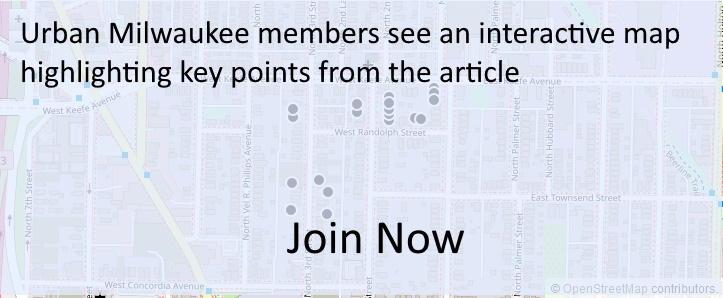
Existing members must be signed in to see the interactive map. Sign in.
If you think stories like this are important, become a member of Urban Milwaukee and help support real, independent journalism. Plus you get some cool added benefits.
Political Contributions Tracker
Displaying political contributions between people mentioned in this story. Learn more.
- September 12, 2014 - Robert Bauman received $386 from Kendall Breunig


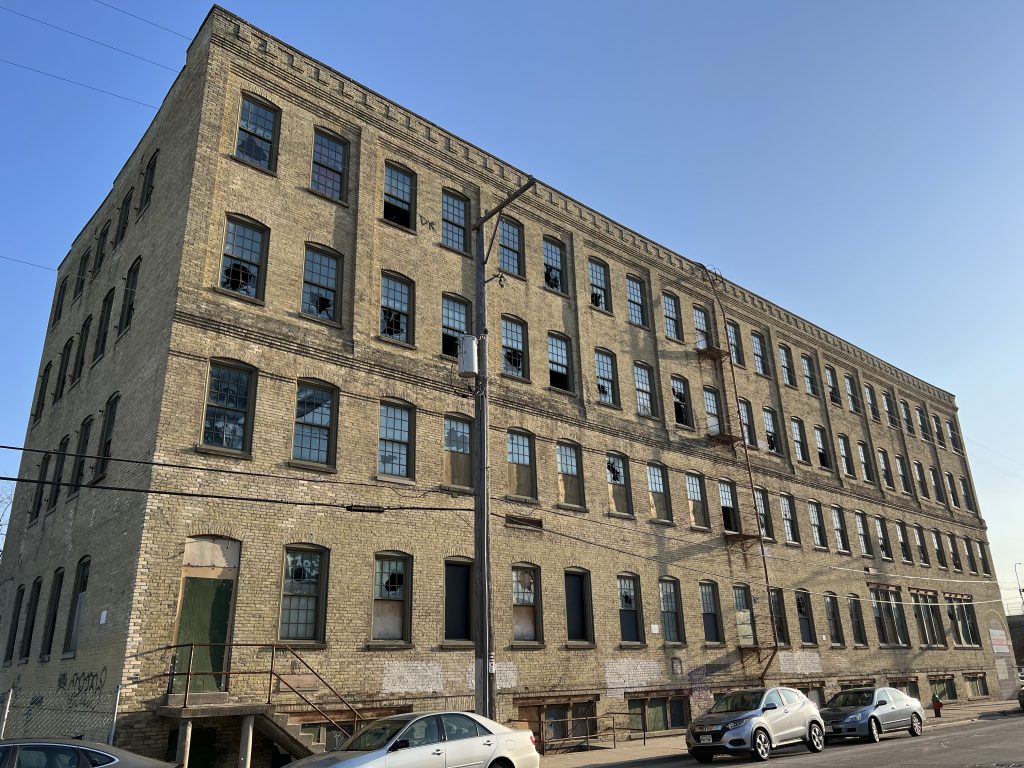
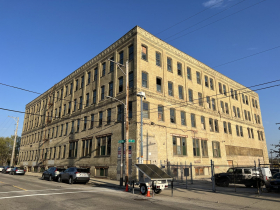
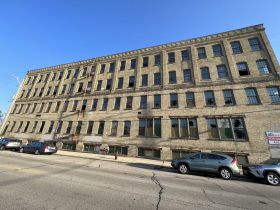
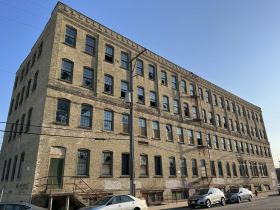
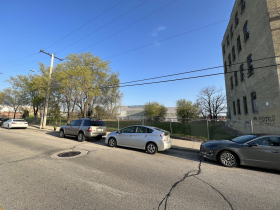




















“If I’m unsuccessful, there really is no feasible use for this building,” said Breunig on Monday.
Not all manufacturing needs modern configurations.
What would the cost be to get the structural capacity raised to, say light industrial?
Perhaps occupancy by multiple smaller tenants would work.
Try different frames of mind on what needs
or combination of needs might be served.
Consider fabrication &/or service needs of current
and future neighbors in the Valley
Who owns the vacant land to the east?
If it’s the city, how about getting a rail siding or 2 in there, to enhance viability of both lots.
There’s likely to be room for a short siding in the West lot alone.
There seems to be a substantial foundation or slab behind the building.
This might be the basis for a rail and/or truck lloading dock that would not compromise the architecture of the building.
Don’t give up easily.